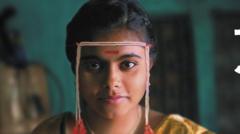Directed by Jayant Digambar Somalkar, "Sthal" poignantly portrays the struggles of Savita, a young woman caught in the web of her family's expectations in rural Maharashtra. With a fresh cast of local talent, the film addresses pressing issues such as dowry and gender discrimination while challenging traditional perceptions of marriage.
"Sthal: A Gripping Reflection on the Trials of Arranged Marriage in India"

"Sthal: A Gripping Reflection on the Trials of Arranged Marriage in India"
The Marathi film "Sthal" sheds light on the humiliations faced by women in arranged marriages, aiming to spark a conversation about societal norms and gender roles.
In recent years, the discourse surrounding arranged marriages in India has shifted, but the reality remains stark for many women. The new Marathi-language film "Sthal: A Match," released in Indian theaters, offers a raw look at this pressing social issue, showcasing the hardships women endure under societal expectations.
Set in rural Maharashtra, the story follows Savita, a determined young woman with aspirations for education and a career, while her father, Daulatrao Wandhare, seeks to secure a "good match" for her amidst a patriarchal backdrop. Director Jayant Digambar Somalkar aims to bring attention to what he describes as a "humiliating" process that many women face when their families attempt to negotiate arranged marriages.
Unlike typical Bollywood narratives that romanticize weddings, "Sthal" starkly reveals Savita’s experiences during marriage meetings. Her encounters with prospective grooms are portrayed as a form of objectification, with men judging her worth based on superficial qualities, leaving her aspirations unheard and unvalued. This portrayal resonates deeply with real-life scenarios where women’s personal ambitions are often sidestepped in favor of societal expectations.
Savita's plight is compounded by the complex dynamics of dowry, a practice that persists despite being illegal. The film also touches upon the emotional and financial high-stakes involved in dowry demands, illuminating the personal and social pressure faced by both women and their families. Woven into the narrative is the grim reality that many families are pushed to the edge, selling their land and assets merely for the sake of marrying off their daughters.
The cast of "Sthal" is comprised entirely of first-time actors from the local village, bringing an authentic touch to the film. Nandini Chikte, who plays Savita, has garnered critical acclaim for her performance, which vividly encapsulates the internal struggle faced by women entrenched in traditional marriage customs.
Somalkar's own childhood experiences with arranged marriage negotiations influenced his decision to create this film. The director hopes to provoke thought and spark conversations around the objectification of women in the marriage process, shedding light on a harsh reality often overlooked in popular media.
"Sthal" is positioned not merely as an artistic endeavor but as a catalyst for societal change, prompting audiences to reflect on the necessity of breaking age-old traditions that confine women to predetermined roles. As it unfolds in theaters, the film seeks to evoke empathy and encourage discussions that could lead to a more equal and respectful understanding of women’s rights in marriage and beyond.
Set in rural Maharashtra, the story follows Savita, a determined young woman with aspirations for education and a career, while her father, Daulatrao Wandhare, seeks to secure a "good match" for her amidst a patriarchal backdrop. Director Jayant Digambar Somalkar aims to bring attention to what he describes as a "humiliating" process that many women face when their families attempt to negotiate arranged marriages.
Unlike typical Bollywood narratives that romanticize weddings, "Sthal" starkly reveals Savita’s experiences during marriage meetings. Her encounters with prospective grooms are portrayed as a form of objectification, with men judging her worth based on superficial qualities, leaving her aspirations unheard and unvalued. This portrayal resonates deeply with real-life scenarios where women’s personal ambitions are often sidestepped in favor of societal expectations.
Savita's plight is compounded by the complex dynamics of dowry, a practice that persists despite being illegal. The film also touches upon the emotional and financial high-stakes involved in dowry demands, illuminating the personal and social pressure faced by both women and their families. Woven into the narrative is the grim reality that many families are pushed to the edge, selling their land and assets merely for the sake of marrying off their daughters.
The cast of "Sthal" is comprised entirely of first-time actors from the local village, bringing an authentic touch to the film. Nandini Chikte, who plays Savita, has garnered critical acclaim for her performance, which vividly encapsulates the internal struggle faced by women entrenched in traditional marriage customs.
Somalkar's own childhood experiences with arranged marriage negotiations influenced his decision to create this film. The director hopes to provoke thought and spark conversations around the objectification of women in the marriage process, shedding light on a harsh reality often overlooked in popular media.
"Sthal" is positioned not merely as an artistic endeavor but as a catalyst for societal change, prompting audiences to reflect on the necessity of breaking age-old traditions that confine women to predetermined roles. As it unfolds in theaters, the film seeks to evoke empathy and encourage discussions that could lead to a more equal and respectful understanding of women’s rights in marriage and beyond.




















